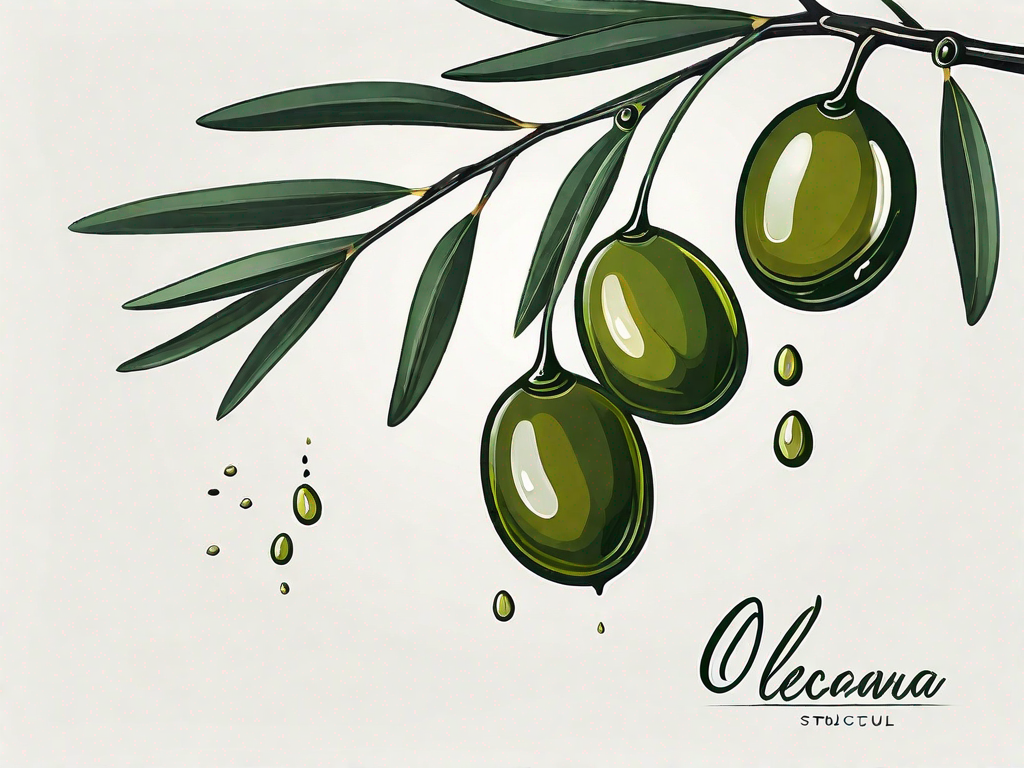
First identified in 1993 by Gary Beauchamp, a sensory scientist, Oleocanthal has been the subject of numerous studies due to its potential health benefits. These benefits are believed to include anti-inflammatory properties, antioxidant effects, and potential cancer-fighting abilities. In this comprehensive glossary article, we will delve into the various aspects of Oleocanthal, from its chemical structure to its health benefits and more.
Chemical Structure of Oleocanthal
Oleocanthal is a type of phenolic compound, specifically a secoiridoid. Secoiridoids are a class of organic compounds that are derived from iridoids, a type of monoterpenes. The chemical structure of Oleocanthal is characterized by two phenolic groups, making it a type of diphenol. These phenolic groups contribute to the antioxidant properties of the compound.
The molecular formula of Oleocanthal is C17H20O5, and it has a molecular weight of 304.34 g/mol. The compound is a clear, colorless to pale yellow liquid at room temperature. The structure of Oleocanthal includes a cyclopentane ring, a characteristic feature of secoiridoids, and a dialdehydic form of decarboxymethyl elenolic acid linked to hydroxytyrosol.
The Extraction of Oleocanthal
The extraction of Oleocanthal is a complex process that involves several steps. The process starts with the extraction of the compound from olive oil, followed by purification and characterization. The extraction process involves the use of organic solvents, while the purification process involves chromatographic techniques.
Despite the complexity of the synthesis process, it is crucial for the production of Oleocanthal for research purposes. The extracted Oleocanthal can be used in various studies to understand its properties and potential health benefits better.
Health Benefits of Oleocanthal
Oleocanthal has been associated with numerous health benefits, primarily due to its anti-inflammatory and antioxidant properties. The compound's ability to inhibit the activity of certain enzymes involved in inflammation makes it a natural anti-inflammatory agent. This property can be beneficial in managing chronic inflammatory conditions like arthritis.
Moreover, Oleocanthal's antioxidant properties help protect the body's cells from damage caused by free radicals. This protective effect can help prevent various diseases, including heart disease and cancer. Additionally, some studies suggest that Oleocanthal may have neuroprotective effects, potentially playing a role in preventing neurodegenerative diseases.
Anti-Inflammatory Properties
Oleocanthal's inflammatory support properties are attributed to its ability to inhibit the activity of cyclooxygenase (COX) enzymes. These enzymes are involved in the production of prostaglandins, which are compounds that play a key role in the body's inflammatory response. By inhibiting COX enzymes, Oleocanthal can reduce the production of prostaglandins.
Research has shown that the inflammatory support effects of Oleocanthal are similar to those of ibuprofen, a common non-steroidal anti-inflammatory drug (NSAID). This has led to the suggestion that a diet rich in olive oil, and therefore Oleocanthal, may have similar effects to taking a low dose of ibuprofen on a regular basis.
Antioxidant Properties
The antioxidant properties of Oleocanthal are due to its phenolic structure. Phenolic compounds are known for their ability to neutralize free radicals, unstable molecules that can cause damage to cells in the body. This damage, known as oxidative stress, is associated with various diseases, including heart disease and cancer.
By neutralizing free radicals, Oleocanthal can help protect the body's cells from oxidative stress. This protective effect is believed to contribute to the health benefits of the Mediterranean diet, which is rich in olive oil.
Role of Oleocanthal in the Mediterranean Diet
The Mediterranean diet, characterized by a high intake of olive oil, fruits, vegetables, and whole grains, is known for its health benefits. These benefits are believed to be partly due to the presence of Oleocanthal in olive oil. The compound contributes to the diet's inflammatory supporting and antioxidant effects, which can help maintain long-term health.
Moreover, the Mediterranean diet is associated with a lower risk of heart disease, certain types of cancer, and neurodegenerative diseases. These protective effects are believed to be partly due to the presence of Oleocanthal and other phenolic compounds in olive oil. Therefore, the role of Oleocanthal in the Mediterranean diet is crucial and contributes to the diet's health benefits.
Conclusion
Oleocanthal is a phenolic compound found in extra-virgin olive oil that is known for its pungent taste and potential health benefits. These benefits, which include inflammatory support and antioxidant effects, are believed to contribute to the health benefits of the Mediterranean diet. Moreover, ongoing research is exploring the potential role of Oleocanthal in long-term health.
Despite the complexity of its extraction, Oleocanthal is a valuable compound for research due to its potential health benefits. As our understanding of this compound continues to grow, it may open up new possibilities for the prevention and treatment of various diseases.
